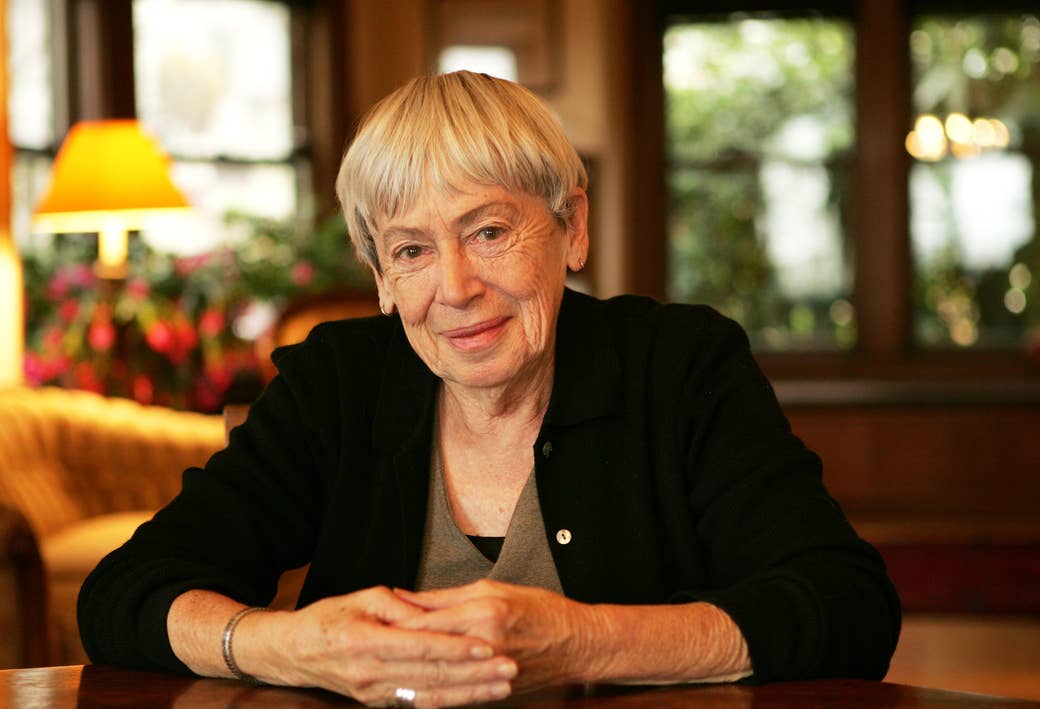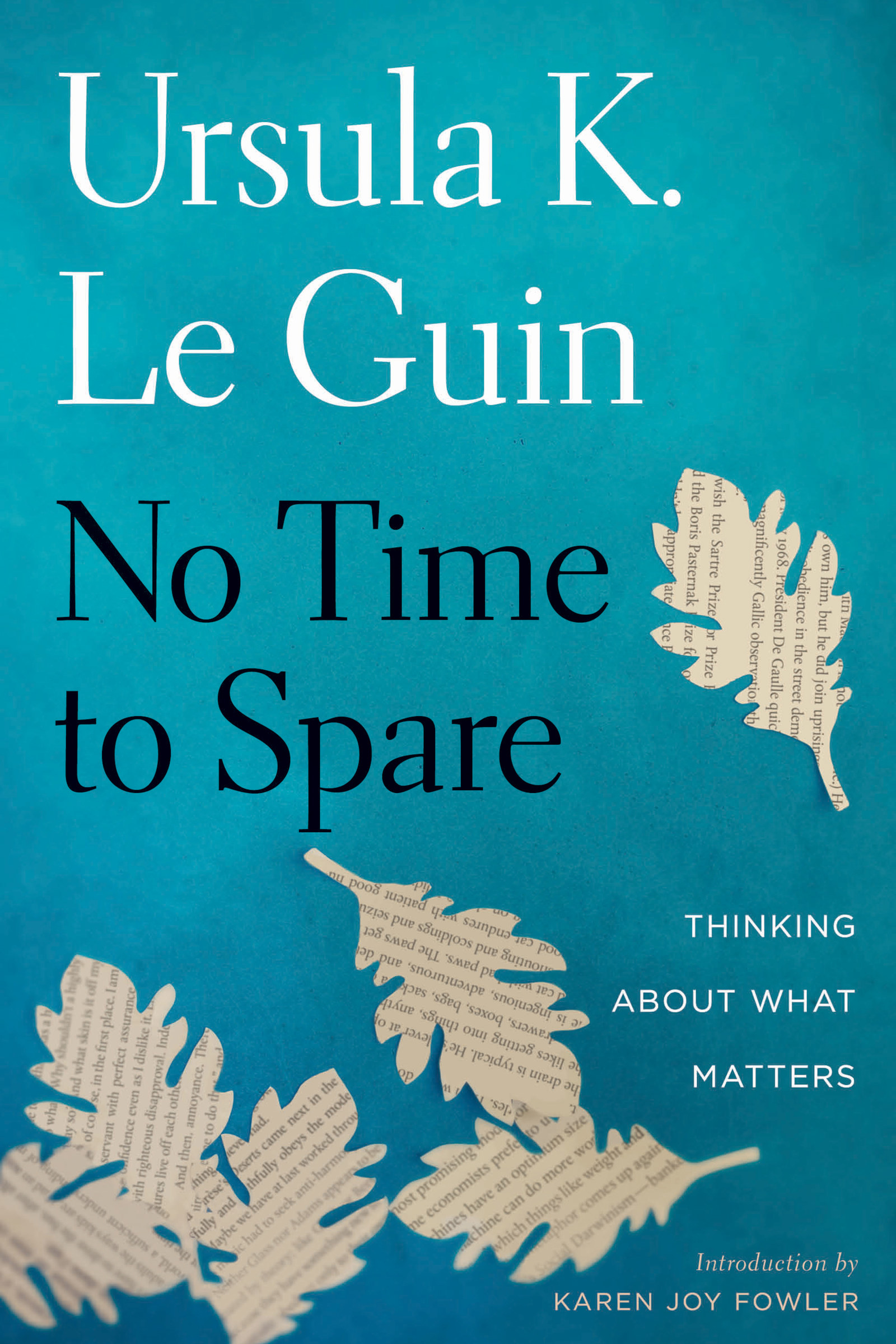
In her new collection of essays, beloved fantasy and science fiction writer Ursula K. Le Guin meditates on aging, literature, human nature, and, of course, cats. Pulled from her blog, her short pieces are as funny as they are thought-provoking — little nuggets of wisdom to pick up here and there. Here are some of our favorites.

“I got a questionnaire from Harvard for the sixtieth reunion of the Harvard graduating class of 1951 [...] Question 14: ‘Are you living your secret desires?’ Floored. I finally didn’t check Yes, Somewhat, or No, but wrote in ‘I have none, my desires are flagrant.’”

“I cannot find anywhere in my life a time, or a kind of time, that is unoccupied. I am free, but my time is not. My time is fully and vitally occupied with sleep, with daydreaming, with doing business and writing friends and family on email, with reading, with writing poetry, with writing prose, with thinking, with forgetting, with embroidering, with cooking and eating a meal and cleaning up the kitchen, with meeting friends, with talking with my husband, with going out to shop for groceries, with walking if I can walk and traveling if we are traveling, with watching a movie sometimes, with lying down for an afternoon rest with a volume of Krazy Kat to read and my own slightly crazy cat occupying the region between my upper thighs and mid-calves, where he arranges himself and goes instantly and deeply to sleep. None of this is spare time. I can’t spare it.”

“A lot of younger people, seeing the reality of old age as entirely negative, see acceptance of age as negative. Wanting to deal with old people in a positive spirit, they’re led to deny old people their reality. With all good intentions, people say to me, ‘Oh, you’re not old!’ [...] To tell me my old age doesn’t exist is to tell me I don’t exist. Erase my age, you erase my life — me.”

“There used to be a lot of small delicate things on shelves around the house. There aren’t now.”

“Meaning in art isn't the same as meaning in science. The meaning of the second law of thermodynamics, so long as the words are understood, isn’t changed by who reads it, or when, or where. The meaning of Huckleberry Finn is.”

“I know that to me words are things, almost immaterial but actual and real things, and that I like them. I like their most material aspect: the sound of them, heard in the mind or spoken by voice. And right along with that, inseparably, I like the dances of meaning words do with one another, the endless changes and complexities of their interrelationships in sentence or text, by which imaginary worlds are built and shared.”

“To accept an award from an institution is to be co-opted by, embodied as, the institution. The guaranteed imprint of salable Success. [...] Which is, of course, precisely what the commercial machinery of bestsellerdom and prizedom wants: the name as product. It isn’t what the people who established the awards want them to do or mean, but it’s how they’re used. As a way to honor a writer, an award has genuine value, but the use of prizes as a marketing ploy by corporate capitalism, and sometimes as a political gimmick by the awarders, has compromised their value.”

“I began quite a while ago to resist declarations of literary greatness in the sense of singling out any one book as The Great American Novel, or even making lists of the Great American Books. Partly because the supposed categories of excellence omitting all genre writing, and the awards and reading lists and canons routinely and unquestioningly favoring work by men in the eastern half of the United States, made no sense to me. But mostly because I didn’t think and don’t think we have much idea of what’s enduringly excellent until it’s endured [...] Art is not a horse race. Literature is not the Olympics. The hell with The Great American Novel. We have all the great novels we need right now — and right now some man or woman is writing a new one we won’t know we needed till we read it.”

“It doesn’t have to be the way it is. That is what fantasy says. It doesn’t say, ‘Anything goes’ — that’s irresponsibility, when two and one make five, or forty-seven, or whuddevva, and the story doesn’t ‘add up,’ as we say. Fantasy doesn’t say, ‘Nothing is’ — that’s nihilism. And it doesn’t say, ‘It ought to be this way’ — that’s utopianism, a different enterprise. [...] ‘Why are things as they are? Must they be as they are? What might they be like if they were otherwise?’ To ask these questions is to admit the contingency of reality, or at least to allow that our perception of reality may be incomplete, our interpretation of it arbitrary or mistaken. [...] Upholders and defenders of a status quo, political, social, economic, religious, or literary, may denigrate or diabolize or dismiss imaginative literature, because it is — more than any other kind of writing — subversive by nature. It has proved, over many centuries, a useful instrument of resistance to oppression.”

“Instead of rising from the rigorous control of aggression in the pursuit of power, the energy of female solidarity comes from the wish and need for mutual aid and, often, the search for freedom from oppression. [...] So when the interdependence of women is perceived as a threat to the dependence of women on men and the childbearing, child-rearing, family-serving, man-serving role assigned to women, it’s easy to declare that it simply doesn’t exist. Women have no loyalty, do not understand what friendship is, etc. Denial is an effective weapon in the hands of fear. The idea of female independence and interdependence is met with scoffing hatred by both men and women who see themselves as benefitting from male dominance. Misogyny is by no means limited to men. Living in ‘a man’s world,’ plenty of women distrust and fear themselves as much or more than men do.”

“To respect and cherish the freshness of perception and the vast, polymorphous potentialities of childhood is one thing. But to say that we experience true being only in childhood and that creativity is an infantile function — that’s something else. I keep meeting this devaluation of growing up in fiction, and also in the cult of the Inner Child. [...] The innocence, the unjudging, unqualified openness to experience of the young child, can be seen as a spiritual quality attainable or reattainable by the adult. And I think this is what the idea of the Inner Child originally, or optimally, is all about. [It] makes no sentimental plea to us to nourish the child we were by denying the value of maturity or by trying to be a child again. However conscious we are of the freedom and awareness and joyfulness we lose as we age, we live a full human life not by stopping at any stage, but by becoming all that is in us to become.”

“I do not believe any animal is capable of being cruel. Cruelty implies consciousness of another’s pain and the intent to cause it. Cruelty is a human specialty, which human beings continue to practice, and perfect, and institutionalize, though we seldom boast about it. We prefer to disown it, calling it ‘inhumanity,’ ascribing it to animals. We don’t want to admit the innocence of the animals, which reveals our guilt.”

“The intellectual acceptance of scientific theory and the belief in a transcendent deity have little or no overlap: neither can support or contradict the other. They rise from profoundly different ways of looking at the same world — different ways of coming at reality: the material and the spiritual. They can and often do coexist in perfect harmony. [...] The idea that only belief sees the world as wonderful, and the ‘cold hard facts’ of science take all the color and wonder out of it, the idea that scientific understanding automatically threatens and weakens religious or spiritual insight, is just hokum.”
For more information on No Time to Spare, click here.

